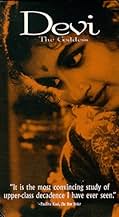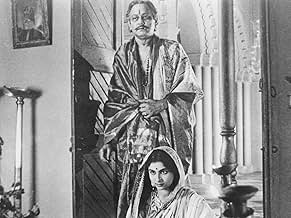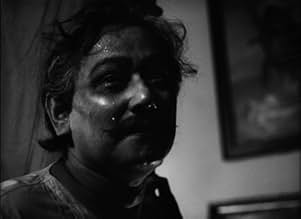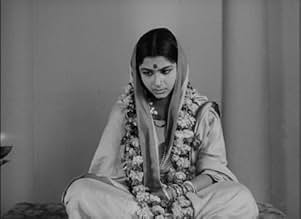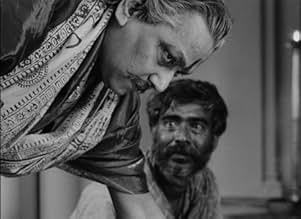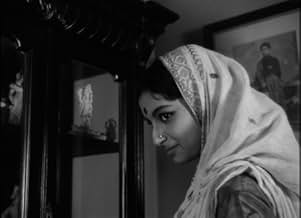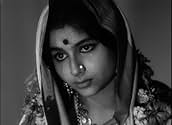NOTE IMDb
7,7/10
3,1 k
MA NOTE
La jeune Doyamoyee est considérée comme une divinité lorsque son beau-père, un puissant seigneur féodal, rêve qu'elle est l'incarnation de la déesse Kali.La jeune Doyamoyee est considérée comme une divinité lorsque son beau-père, un puissant seigneur féodal, rêve qu'elle est l'incarnation de la déesse Kali.La jeune Doyamoyee est considérée comme une divinité lorsque son beau-père, un puissant seigneur féodal, rêve qu'elle est l'incarnation de la déesse Kali.
- Réalisation
- Scénario
- Casting principal
- Récompenses
- 1 victoire et 1 nomination au total
Soumitra Chatterjee
- Umaprasad
- (as Soumitra Chattopadhyay)
Karuna Bannerjee
- Harasundari
- (as Karuna Bandyopadhyay)
Purnendu Mukherjee
- Taraprasad
- (as Purnendu Mukhopadhyay)
Arpan Chowdhury
- Khoka - Child
- (as Shriman Arpan Chowdhury)
Anil Chatterjee
- Bhudeb
- (as Anil Chattopadhyay)
Avis à la une
After watching Satyajit Ray's The Apu Trilogy (1955-1959), which are now my favourite films of all time, I was looking forward to watching Devi, the next film Ray directed after The Apu Trilogy. Although I couldn't feel the same kind of emotional connection with the characters in Devi that I felt in The Apu Trilogy, this film was thought-provoking and very intriguing to watch.
Devi dealt with a serious issue in Bengali society at the time in a mature manner and Ray's direction and cinematography for this film was just as superb as The Apu Trilogy. It starred Soumitra Chatterjee and Sharmila Tagore once again as a married couple, like in Apur Sansar (the final part of The Apu Trilogy). However, whereas it was Soumitra who played the lead role in Apur Sansar, this time it's Sharmila who plays the lead role in Devi. Her performance was very subtle for the first half but her delusional performance towards the end was very convincing. Overall, I'd highly recommend this movie to any Satyajit Ray fan.
8/10
Devi dealt with a serious issue in Bengali society at the time in a mature manner and Ray's direction and cinematography for this film was just as superb as The Apu Trilogy. It starred Soumitra Chatterjee and Sharmila Tagore once again as a married couple, like in Apur Sansar (the final part of The Apu Trilogy). However, whereas it was Soumitra who played the lead role in Apur Sansar, this time it's Sharmila who plays the lead role in Devi. Her performance was very subtle for the first half but her delusional performance towards the end was very convincing. Overall, I'd highly recommend this movie to any Satyajit Ray fan.
8/10
A film that explores the line between the good aspects of faith (e.g. humility) and the bad (e.g. ignorance) when an elderly man has a dream that his daughter-in-law is the incarnation of the goddess Kali, and immediately begins venerating her. In Hinduism the idea of one of the deities from its pantheon incarnating as a mortal is fairly common and has some interesting and profound philosophical implications, but here we feel a deep sense of falseness and unease. When the young woman's husband returns to find her on a dais surrounded by chanting worshippers he eventually tries to get her out of there, but she begins to wonder whether she might indeed be Kali, and if leaving may cause the gods to inflict their wrath upon him. It all seems a little crazy - a single fleeting moment in an old man's dream, and suddenly streams of people are coming to a trapped young woman, some bearing sick children and expecting her to heal them.
Before the dream, the old man has a somewhat creepy relationship with her - for example, calling her 'mother' and praising her while she waits on him and tenderly washes his feet. Later we find out she's just 17 years old, and has been married for 3 years, causing some uncomfortable internal math even if it is based on the reality of 19th century India (and apparently a true story). Sharmila Tagore plays the conflicted aspects of the part well, and she was only 16 years old. I found that the film was an interesting look into the culture - and director Satyajit Ray's criticism of blind faith - but the pace of the film was a little too slow for what is a pretty simple story. It finishes strong though, and with some powerful images of Tagore.
Before the dream, the old man has a somewhat creepy relationship with her - for example, calling her 'mother' and praising her while she waits on him and tenderly washes his feet. Later we find out she's just 17 years old, and has been married for 3 years, causing some uncomfortable internal math even if it is based on the reality of 19th century India (and apparently a true story). Sharmila Tagore plays the conflicted aspects of the part well, and she was only 16 years old. I found that the film was an interesting look into the culture - and director Satyajit Ray's criticism of blind faith - but the pace of the film was a little too slow for what is a pretty simple story. It finishes strong though, and with some powerful images of Tagore.
Satyajit Ray made "Devi" in 1960. It was only his sixth film after completeing his 'Apu Trilogy' and "The Music Room" but it's much less well-known and little seen today. It's also a masterpiece. The great Chhabi Biswas, (he of "The Music Room"), once again plays a rich, lonely old man who comes to believe his daughter-in-law is a reincarnation of the Goddess Kali. If the tale is a fanciful one it's grounded in the harsh realities of the India of the time, (it's set in the mid-nineteenth century), and its heart is a heart of darkness. Goddess or witch, the end result is the same; such superstition can only have a tragic outcome and this is one of Ray's finest tragedies. Working again with what was basically his stock company, Ray draws superb performances from his cast and like so much of his work, this is a great ensemble piece, superbly shot by Subrata Mitra and scored by Ali Akbar Khan. It's a film that cries out for restoration and rediscovery.
'Devi' is so good I went out and bought the whole 'Apu Trilogy.' Which was expensive, and I'm poor. 'Devi' is so good that I've watched it enough times to be able to mouth along to it in Bengali, and I don't speak Bengali. "Khoka khotay?" "Aaaa... cheko ta." (I'm now learning Bengali because I love this movie so much!)
There is such an intricate web of relationships between the characters, that it reminds me of Macbeth. The story is very specifically about the Indian culture (it's revealing investigation into Hinduism could have happened nowhere else) but its tale of strife between generations is something anyone can understand and feel.
If you would like to talk about this film, please email me! "Namoskar." (I'm pretty sure that means 'goodbye!')
There is such an intricate web of relationships between the characters, that it reminds me of Macbeth. The story is very specifically about the Indian culture (it's revealing investigation into Hinduism could have happened nowhere else) but its tale of strife between generations is something anyone can understand and feel.
If you would like to talk about this film, please email me! "Namoskar." (I'm pretty sure that means 'goodbye!')
In the countryside of India, Umaprasad (Soumitra Chattopadhyay) has been happily married with his seventeen year-old wife Doyamoyee (Sharmila Tagore) for three years. They live in the house of Umaprasad´s father Kalikinkar Roy (Chhabi Biswas), who worships the goddess Kali, with Umaprasad´s elder brother Taraprasad (Purnendu Mukhopadhyay), his wife Harasundari (Karuna Bandyopadhyay) and their child Khoka. Umaprasad has a conversation with Doyamoyee and explains that he will move to the big city to study English and she questions why he needs to travel to go to school. Sometime later, Kalikinkar has a dream that Doyamoyee is the reincarnation of Kali and the locals come to Kalikinkar´s house to worship her. Doyamoyee asks Harasundari to write to Umaprasad and soon he returns home. But Doyamoyee has been brainwashed with the situation and begins to believe that she might be the reincarnation of Kali leading the family to a tragedy.
"Devi", a.k.a. "The Goddess", is a little gem with a story of family tradition (and respect), religion, superstition and ignorance in the Nineteenth Century in India. "Devi" is beautifully shot in black-and-white and has magnificent performances and a perfect open conclusion. My vote is eight.
Title (Brazil): "A Deusa" ("The Goddess")
"Devi", a.k.a. "The Goddess", is a little gem with a story of family tradition (and respect), religion, superstition and ignorance in the Nineteenth Century in India. "Devi" is beautifully shot in black-and-white and has magnificent performances and a perfect open conclusion. My vote is eight.
Title (Brazil): "A Deusa" ("The Goddess")
Le saviez-vous
- AnecdotesSharmila Tagore was just 15 when she filmed this role.
- Citations
Kalikinkar Roy: [while Doyamoyee strokes his feet] Do you know who I'm worried about? I'm worried about your Christian husband. You never know the intention of boys today.
- ConnexionsFeatured in The Story of Film: An Odyssey: Sex & Melodrama (2011)
Meilleurs choix
Connectez-vous pour évaluer et suivre la liste de favoris afin de recevoir des recommandations personnalisées
- How long is The Goddess?Alimenté par Alexa
Détails
Box-office
- Montant brut aux États-Unis et au Canada
- 93 215 $US
- Durée1 heure 33 minutes
- Couleur
- Mixage
- Rapport de forme
- 1.37 : 1
Contribuer à cette page
Suggérer une modification ou ajouter du contenu manquant



